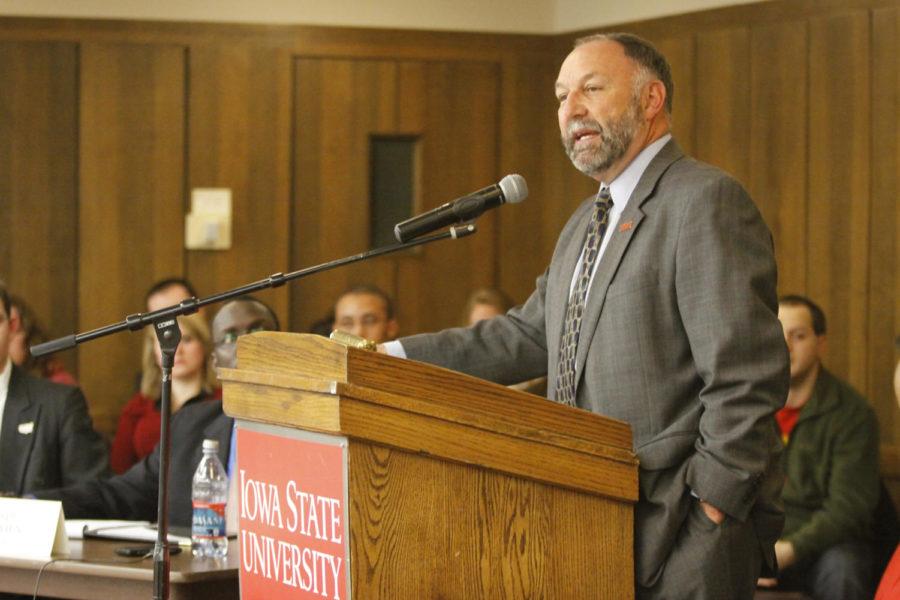President Leath discusses Harkin Institute scandal with Faculty Senate
Photo: Chenyan Shan/Iowa State Daily
President Steven Leath gives a speech after the discussion of Senate bills and issues affecting students. The Government of the Student Body met Feb. 20 in the Campanile Room at the Memorial Union.
April 2, 2013
ISU President Steven Leath faced pressing questions from members of the Faculty Senate regarding the Harkin Institute controversy.
At the Faculty Senate’s April 2, 2013 meeting, Leath opened the floor for questions, which led to the topic of the Harkin Institute. Leath stated that there have definitely been lessons learned from the situation.
“I still believe there’s a lot of inherent risk in naming any institute or entity of a public university after a sitting politician. I think we should have been more thoughtful and careful when we did it,” Leath said. “Starting [the process] the way we did was inherently dangerous.”
The issue of the institute overlapping the interest of the Center of Agricultural and Rural Development or the Department of Agriculture in performing agricultural research is lesson number two.
Leath said that having the institute’s primary function be agriculture probably would have been fine, had the Center of Agricultural and Rural Development and the Department of Agriculture been notified.
“That is naturally going to create some distrust. I think we should be cooperative and collaborative, and how is that possible when we start off like that?” Leath said.
What was equally as “bad,” as Leath put it, was not informing the Harkins or the Harkin Institute of the restriction on working with agriculture, creating distrust on the other side of the situation.
The vote done by the Board of Regents on the original documents may have also spiked this misunderstanding.
The board’s vote said that the Harkin Institute had no overlap with existing programs at Iowa State, with Leath responding by saying “that was just wrong.” Leath said he feels the whole situation should be done over.
“We [could] go all the way back to the faculty. They would address any concerns about academic freedom and just start all over in the full light. Had that been done in a much more studious, thoughtful, open manner, we wouldn’t be in this situation,” Leath said. “Lesson learned. If we want to have another institute or center, I’ll be all for it, but we’ll insist that it be done in the light.”
Leath also addressed concerns on the subject of the controversial Board of Regents nominees. He advised faculty members to stay neutral in the situation and to let it take a natural course, saying the situation will get worse before it gets better, so it’s best for faculty not to get involved.
Faculty members are anxious about the projected increase in students for fall 2013. Leath, for the first time, said 32,000 is roughly the expected number, putting additional strain on teachers in the classroom. Students have increased 25 percent in the last 10 years, and faculty has not noticeably grown.
To compensate for the student increase, President Leath and Provost Jonathan Wickert have a goal of hiring 200 new faculty members in about 24 months. 70 new faculty have already been added.
President Leath shared an initiative to enhance institutional excellence.
Stressing the need for a strong faculty, the initiative includes a desire to increase doctorate and graduate student enrollment, building a collaborative science culture, increasing national recognition of faculty and how to enhance the arts and humanities program on campus.
Leath stressed to the faculty how important they are to maintaining a strong campus unit.
“I always look at campuses as churches,” Leath said. “They’re not about the building, they’re about the congregation, the people there. The faculty are the heart and soul of the campus … we want to do whatever we can to help you.”







